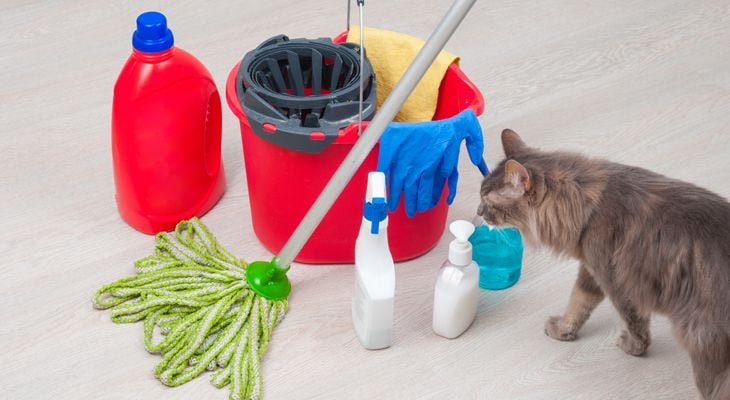
Many cat owners already know that insecticides and antifreeze are not things their cats should consume. However, many everyday, innocuous-seeming substances are also poisonous to cats. From a beautiful bouquet of lilies to human medications casually left around the house, you never know what you cat might get into. That’s why it is best to educate yourself before disaster strikes.
Signs of Poisoning
If your cat consumes the wrong thing, you will see a sudden onslaught of symptoms. They may include:
- Diarrhea
- Vomiting
- Dilated pupils
- Disorientation
- Staggering
- Breathing troubles
- Coughing
- Drooling
- Shivering, tremors or seizures
- Sudden weakness
What’s Poisonous?
Here are a few things that may be poisonous to your cat.
Indoor and Outdoor Plants
Yard landscapes, houseplants and bouquets all can contain beautiful hazards for your cat. Lilies are especially poisonous to cats, and are very common in bouquets, especially around Easter. Chrysanthemums and tulips are also better left outside. Poinsettias, mistletoe, azaleas and marijuana can all harm your cat as well.
Human Medicines
Of course you do not want your cat to take any prescriptions meant for humans. Nonetheless, even over-the-counter drugs and supplements, such as pain relievers, cold medicines and vitamins, can poison felines. Always talk to your vet before administering any medication to your cat.
Common Foods
Many foods that are healthful for humans are harmful to cats. These include chocolate, garlic, onions, grapes, raisins, chives and yeast dough. Nor should you serve your cat coffee or alcoholic drinks. Xylitol, a common ingredient in sugarless candies, gum and toothpaste, is also a no-no.
Chemicals
Bleach, fertilizers and detergents are obviously contraindicated, but you might be surprised at how good they taste to cats. Lock these chemicals away. Remember, cats are dedicated to hygiene. They can accidentally ingest poisons while cleaning their paws.
Permethrin Poisoning
Many cats are poisoned by well-meaning owners who use flea medicines designed for dogs on their cats. According to the ASPCA Animal Poison Control Center, ingesting the ingredient permethrin accounts for a large percentage of feline toxicities. Cats may also be poisoned by indirect exposure, such as grooming a dog friend after the dog’s been treated with flea medication.
Treatment
If you act quickly, you have a better chance of saving your poisoned cat. Call your vet or the Animal Poison Control Center at (888) 426-4435 immediately. It’s a good idea to keep these numbers on your fridge or a bulletin board, so you can easily access them in emergencies.
If your cat has ingested a poisonous agent, and you are able to take him or her to your vet, your vet will probably ask you to collect samples of vomit or stool. Take those and the poison to the vet (along with your cat). Depending on the poisonous agent, your vet might induce vomiting, administer activated charcoal to soak up any remaining poison or start fluid therapy to control the level of acid in the blood. Muscle relaxants or anti-seizure medications might be necessary if the cat is having muscle tremors or seizures.
If you think your cat has consumed poison, call our office or the Animal Poison Control Center immediately. There’s no time to waste.

